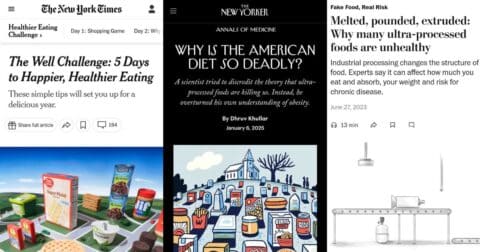News
GLP-1 Users Lose Weight, and Their Taste for Meat
Research•3 min read
Explainer
Health coverage continues to mostly overlook climate impact from food.


Words by Jessica Scott-Reid
As the calendar flips to a new year, media outlets are once again publishing their annual advice for eating healthier and living better. This year, health reporters continue to be obsessed with the problem of ultra-processed food. And while we are happy to see journalists include research-backed guidance in their coverage, on the whole, our health news feed seems to be missing some vital information.
This year’s crop of healthy eating stories seems to be getting some things right — limiting ultra-processed foods and adding more plants to your diet among them — but journalists and editors continue to miss opportunities to report on health from a broader perspective, one that includes the climate impacts of meat.
Matthew Hayek, assistant professor in the Department of Environmental Studies at New York University, tells Sentient that there’s a general lack of awareness among both the public and the media “about how many resources meat and dairy production really requires,” and “that awareness could really benefit a lot of coverage of this issue.”
Hayek believes there is concern among reporters that “discussing sustainability and diet can feel like piling on to what is already a very fraught, personal and cultural issue.” However, Hayek adds, “what’s really infrequently discussed is that healthy diets and sustainable diets are largely the same thing.”
One of the most popular reported topics related to healthy eating in 2025 is undoubtedly ultra-processed foods. Questions about which foods actually qualify as ultra-processed, and how much of them we should and should not be eating, continue to pique reader interest. But while there is a growing body of research raising concerns about ultra-processed foods, not all media coverage is providing readers with a clear picture of the science.
The Washington Post and the New York Times both took on the topic of ultra-processed foods in their New Year’s resolution coverage this year, with the New York Times’ “The Well Challenge: 5 Days to Happier, Healthier Eating” kicking off an entire series on ultra-processed foods. “We’re not just paying attention to the nutrients in our food,” the article reads. “We’re also looking for clues to tell whether a food was processed — and if so, how much.”
What we know: a growing body of studies suggests ultra-processed food consumption might be linked to an increased risk of a host of health problems, including obesity, heart disease and cancer. These foods, which make up more than half of the calories consumed at home in the U.S., are optimized to bypass our body’s natural satiety cues, which can lead to eating more than you intended.
But researchers do not agree on, nor do they know for sure, what it is about ultra-processed food that is the culprit. In fact, there is still fierce debate over the category itself. As the Washington Post reports, “not all ultra-processed foods are created equal.” The Post’s story on “healthier processed foods” explains that some foods deemed ultra-processed by some researchers, such as sliced bread and peanut butter, can be part of a healthy diet.
Kevin Hall, nutrition and metabolism researcher at the National Institutes of Health, said this to the New York Times: “Not all ultra-processed foods are necessarily bad for you,” and not all unprocessed foods are good for you, either. “Just because Grandma made it, doesn’t make it healthy.”
For Teresa Fung, professor of nutrition and dietetics at Simmons University, and adjunct professor at Harvard University’s T.H. Chan School of Public Health, whether a food is ultra-processed matters less to her than what it’s made of. “It really depends on what the food is,” she told Sentient. “The things I would rather look at are the ingredients list, as well as the nutrient content.”
Not only does coverage of this topic tend to confuse people about what’s good for their own health, but the lack of clarity can have major consequences for climate action. The reporting often overlooks or even discourages the very shift that climate experts are encouraging in the global north to reduce environmental impact: plant-based diets.
Case in point: media coverage positioning plant-meats as ultra-processed and unhealthy. This narrative emerged a few years back, with some links to the meat industry emerging even, and continues to this day.
For example, a Lancet study published in 2024, examining how ultra-processed foods affect heart health and mortality risk, led to outlets including the Daily Mail, New York Post and People magazine linking (incorrectly) plant-based foods to increased heart disease risk. In that study, plant-based meats made up only 0.5 percent of participants’ diets, among other “plant-based” ultra-processed foods like biscuits and soda.
More recently (and more accurately), the New York Times summed up the issue of plant-based meats being roped into the processed foods narrative as follows: “If plant based meat must be categorized as processed food, the argument is that they are more like canned beans than Twinkies, and a long way from processed meats, the category that includes hot dogs, bacon and deli meat, which the World Health Organization has classified as carcinogenic to humans.”
However, this broader take on ultra-processed food was part of The New York Times’ climate coverage, not its New Year’s Resolution health coverage; another example of how climate coverage is often siloed from the rest of the newsroom, leading to conflicting information from story to story.
One diet often touted by the media as one of the healthiest is the Mediterranean Diet. This diet, according to CNN’s “2025 best diet wins gold for wellness and disease prevention,” focuses on fruits, vegetables, grains, olive oil and nuts, with limited dairy, meat and sweets.
CNN and others get the personal health angle here right. According to Harvard School of Public Health, “research has consistently shown that the Mediterranean diet is effective in reducing the risk of cardiovascular diseases and overall mortality.” But once again, the news coverage tends to leave climate and other environmental concerns out of the discussion of what constitutes healthy food choices, by encouraging a shift to fish from meat without mentioning any of the tradeoffs.
As climate change grows worse, fish will become harder to count on as a food source. According to one paper on the Mediterranean diet, published in the American Heart Journal Plus, which touches on this concern, “rising sea levels and ocean temperatures can disrupt marine ecosystems, affecting fish populations.”
The practice of overfishing also creates serious climate impacts. Oceans can absorb around 31 percent of carbon dioxide emissions and store 60 times more carbon than the atmosphere, with billions of sea creatures, from sardines to whales, sustaining this cycle. As Heidi Pearson, a marine biology professor at University of Alaska Southeast, told Sentient in 2024, “The more fish we take out of the ocean, the less carbon sequestration we are going to have.” According to rough calculations by Sentient, ending the practice of overfishing would store the same amount of carbon as 6.5 million acres of forest each year.
One of the most highly consumed fish, salmon, comes with a host of environmental and ethical issues. An estimated 70 percent of the world’s salmon now comes from fish farms, where crowded conditions promote disease spread, leading to increased antibiotic use and resistance in humans. Escaped farmed salmon can also threaten wild fish populations, and aquaculture waste can pollute surrounding ecosystems. Yet in most healthy eating coverage, you rarely hear more about salmon beyond the fact that it is a healthy source of omegas.
In its “10 Tips to Help You Eat Healthier in 2025,” The New York Times does a little better by mentioning the environmental impact of seafood. It highlights bivalves — clams, oysters, mussels, and scallops — as more sustainable sources of protein, “without the environmental baggage of many other seafood options.”
Worth pointing out, however, that not every researcher agrees. Ecologist Spencer Roberts tells Sentient via email, while bivalve farms may have some environmental benefits, they are “a sad substitute for an oyster reef,” and reintroducing bivalves in restoration projects offers more ecological value than aquaculture operations.
With all the talk of health and wellness in the New Year, it’s inevitable that newer diet fads dominate the news. In Newsweek’s coverage of “Food Trends to Embrace in 2025, According to Scientists,” the outlet tackles hot topics like gut health, intermittent fasting, and of course, ultra-processed foods. It also takes on the social media-hyped carnivore diet — eating almost exclusively meat and other animal products — in comparison to a plant-based diet.
First, let’s talk about what Newsweek’s expert, professor and author Tim Spector, gets right. He does not recommend the carnivore diet, which lines up with what most registered dietitians have to say. He also told Newsweek, “You don’t need to become vegan, but adding more vegetables, legumes, nuts and seeds, whole fruits and whole grains while reducing red and processed meats is a winning strategy.” He’s not entirely wrong, especially when it comes to personal health. Eating more plants, and less meat, is both good for you, and it’s also good for the planet. But does continuing to position “vegan” as extreme (like the carnivore diet) give readers useful and accurate information?
In much of the current mainstream news coverage on healthy eating in the New Year, this appears to be a common theme: focusing on plant-heavy diets, without suggesting people eat plant-exclusive. Whether it’s the Mediterranean diet, DASH diet (or the MIND diet, which combines the two), Flexitatianism or Reducetarianism, mindfully eating less meat and more plants continues to be an evolving trend.
Presumably Newsweek wants its readers to know that eating habits don’t have to be all or nothing. If a vegan diet seems too challenging, eating less is certainly progress from decades past. (We’ve made similar points here at Sentient, too.) But people care about climate action and they also care about animal welfare, according to polling research. What to eat is an individual choice, but these choices have impacts, and good journalism has an obligation to include that information.
Eating a vegan diet has well-documented environmental benefits, even at the individual level, including cutting one’s climate emissions by about 75 percent, and water usage by over half. At the global level, a shift to a plant-based food system would reduce global agricultural land use by an estimated 75 percent, freeing up those spaces for the kind of crucial rewilding that can help offset emissions.
As the accelerating effects of climate change are becoming more and more visible, perhaps 2026 New Year’s Resolution coverage will see mainstream media make the connection between planetary health and personal diets — trending or not. “There’s a lot of room for win-wins here,” says Hayek, as “diets that are more healthy are more sustainable, and vice versa.” He suggests that journalists reporting on healthy eating seek out environmental scientists, like himself, to get the bigger picture.